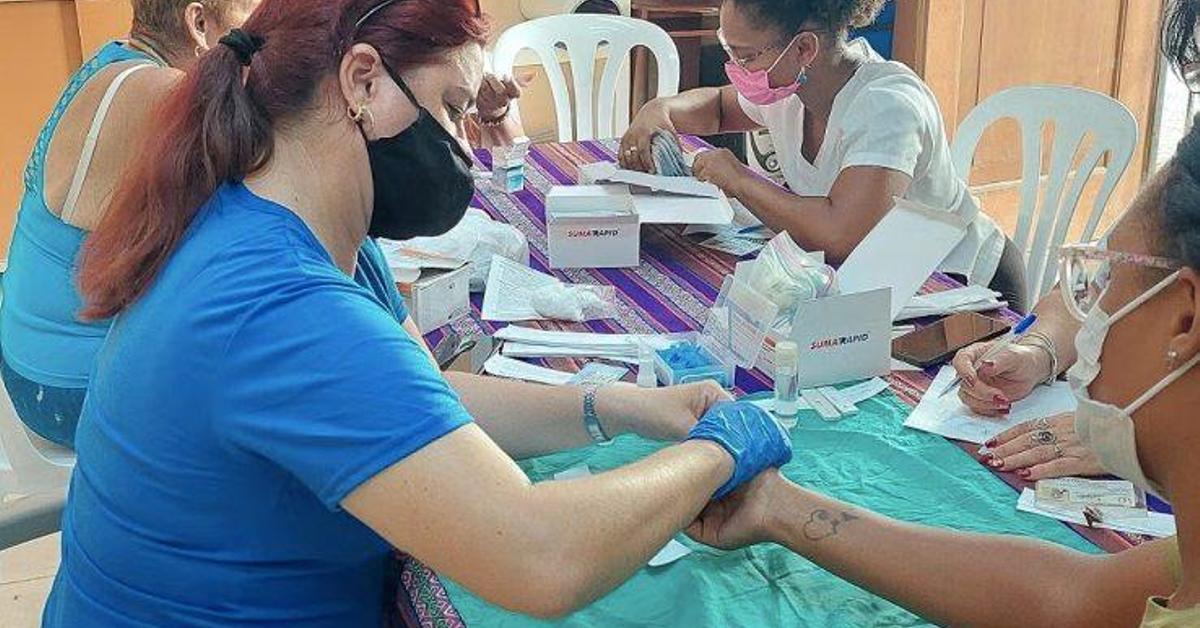Sancti Spíritus/For weeks Darián has not touched the lunch offered at his workplace and he replaced the water in the drinking fountain with that from a plastic bottle, which he carries daily from his home. The reason is the hepatitis A outbreak that has lying to work colleagues, family and neighbors, and that people from Sancti Spiritus try to avoid at all costs.
The 35-year-old assures 14ymedio who knew that the viral disease, which is spread through the oral-fecal route, was wreaking havoc in the province. But it was not until last week, when she heard comments from a Public Health inspector, that she became aware of the danger. “You can get infected with contaminated water. That’s why I told my son not to drink guarapo or instant soft drinks on the street,” said the specialist, who assured that the virus had spread at a dizzying speed, especially in the popular council of Colón.
This Thursday, Escambray published a article that officially recognizes the epidemic: “Sancti Spíritus reported an increase in patients with hepatitis A at the end of 2024, when it reported around 1,080 diagnosed cases; trend maintained at the beginning of this year and that has led the Health authorities in the province to reinforce control and prevention actions to reduce the incidence of this condition,” the article explains.
In an interview with the media, Dr. Yurien Negrín Calvo, deputy director of the Provincial Center for Hygiene, Epidemiology and Microbiology, recalled the contagion of hepatitis A that occurred months ago in the municipality of La Sierpe. However, he assured that the cases from then have no relationship with those now.
“For a fairly long period Sancti Spíritus did not report an increase in cases like the current one”
“For a fairly long period – around 10 years – Sancti Spíritus did not report an increase in cases like the current one, because there were many measures for other diseases that mitigated the presence of hepatitis A. Today that cycle has been broken in our environment. “, and we do have to talk about an increase in cases if we compare it with previous years,” clarifies Negrín Calvo, who located the new outbreaks, in addition to La Sierpe, in Cabaiguán and the provincial capital.
However, it is likely that the numbers mentioned in the newspaper are far below the real number of contagion. “I remember the inspector saying that many people did not go to the Guard Corps because they already knew they had the disease because a relative had suffered from it. Since they do not send treatment in addition to rest, many stay at home,” says Darián.
Fleeing hospitals due to the poor state of health infrastructure has become a common recipe for Cubans to avoid getting sick, especially when it comes to viral diseases – such as dengue, flu and, now, hepatitis A – and for that doctors have no choice but to order rest and fluids.
Negrín Calvo confirms this: “Almost all cases are presumptive because we do not have the means of specific laboratory confirmation to do so; However, the clinic and epidemiology can help us with the diagnosis. Added to this is a number of patients who do not go to the Health services and that is another under-reporting that there is no way to count,” laments the doctor.
Hospitals usually rely on TGP tests, which help rule out other diseases due to transamine alterations, but they do not guarantee that, when positive, the patient appears to have hepatitis A, so doctors must rely on symptoms and luck. .
Faced with an untreated disease that hospitals themselves cannot accurately diagnose, Darián prefers not to risk it.
Faced with an untreated disease that the hospitals themselves cannot accurately diagnose, Darián prefers not to take risks and take care of what he touches and consumes as much as possible. To make matters worse, he argues, “you can get infected today and be incubating the bug up to 50 days. Then it takes a long time to recover and you have to do TGP every 21 days until your parameters are no longer altered,” he warns.
The symptoms of hepatitis A are also of concern. “According to what people close to me who have had it have told me, the virus causes a lot of weakness, intermittent fevers, loses appetite, causes stomach upset – sometimes serious, with diarrhea or vomiting – and the stools turn white and the urine brick-colored. “, account. “To make matters worse, we have the outbreak in the middle of a bed bug epidemic “That already makes me paranoid, because I’m afraid to sit anywhere or carry them on my clothes.”
To prevent the spread of the disease, Negrín Calvo recommends first of all maintaining control of the food and water consumed, especially regarding its hygiene and, in general, “keep all landfills or micro-landfills collected to avoid the spread of the disease.” environmental pollution.” However, the specialist herself remembers the biggest obstacle to completing the task. “The situation that the province presents with the hydrosanitary network should not be ignored: leaks, cross contamination, siphoning because there is no continuous supply of water.” The answer, he argues, is to “become sensitive” to the use of hypochlorite.
In the family environment, the doctor recommends absolute hygiene, especially when it comes to dishes, clothing, hands and if caring for babies and sick people. Once again, reality violates his advice. “How are we going to avoid contagion if we all use the same bathroom and there is no water to keep it clean?” asks Darián, aware of the Health suggestions. “Hepatitis must be avoided at all costs and, if it catches us, may God protect us.”














